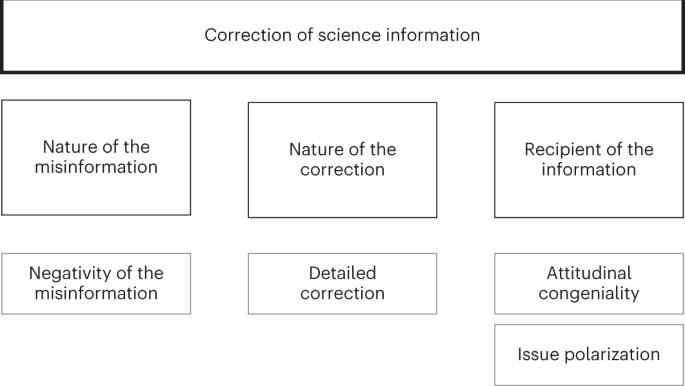A meta-analysis of correction effects in science-relevant misinformation
IF 21.4
1区 心理学
Q1 MULTIDISCIPLINARY SCIENCES
引用次数: 0
Abstract
Scientifically relevant misinformation, defined as false claims concerning a scientific measurement procedure or scientific evidence, regardless of the author’s intent, is illustrated by the fiction that the coronavirus disease 2019 vaccine contained microchips to track citizens. Updating science-relevant misinformation after a correction can be challenging, and little is known about what theoretical factors can influence the correction. Here this meta-analysis examined 205 effect sizes (that is, k, obtained from 74 reports; N = 60,861), which showed that attempts to debunk science-relevant misinformation were, on average, not successful (d = 0.19, P = 0.131, 95% confidence interval −0.06 to 0.43). However, corrections were more successful when the initial science-relevant belief concerned negative topics and domains other than health. Corrections fared better when they were detailed, when recipients were likely familiar with both sides of the issue ahead of the study and when the issue was not politically polarized. This meta-analysis by Chan and Albarracı́n finds that science-relevant misinformation was, on average, persistent, and corrections fared better when they were detailed, when recipients were likely familiar with both sides of the issue ahead of the study, and when the issue was not politically polarized.

科学相关错误信息纠正效果的荟萃分析。
与科学相关的错误信息,被定义为与科学测量程序或科学证据有关的虚假声明,无论作者的意图如何,2019冠状病毒病疫苗含有追踪公民的微芯片的虚构说明了这一点。更正后更新与科学相关的错误信息可能具有挑战性,而且对哪些理论因素会影响更正知之甚少。在这里,这项荟萃分析检查了205个效应大小(即k,从74份报告中获得;N = 60861),这表明试图揭穿与科学相关的错误信息平均来说并不成功(d = 0.19,P = 0.131,95%置信区间-0.06至0.43)。然而,当最初的科学相关信念涉及健康以外的负面话题和领域时,修正更成功。当更正内容详细时,当接受者可能在研究前熟悉问题的双方,并且问题没有政治两极分化时,更正效果更好。
本文章由计算机程序翻译,如有差异,请以英文原文为准。
求助全文
约1分钟内获得全文
求助全文
来源期刊

Nature Human Behaviour
Psychology-Social Psychology
CiteScore
36.80
自引率
1.00%
发文量
227
期刊介绍:
Nature Human Behaviour is a journal that focuses on publishing research of outstanding significance into any aspect of human behavior.The research can cover various areas such as psychological, biological, and social bases of human behavior.It also includes the study of origins, development, and disorders related to human behavior.The primary aim of the journal is to increase the visibility of research in the field and enhance its societal reach and impact.
 求助内容:
求助内容: 应助结果提醒方式:
应助结果提醒方式:


